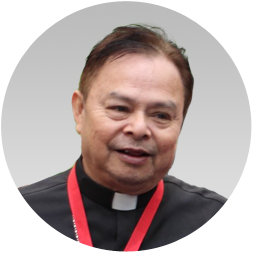WANTED: MEN OF PRINCIPLES

By: The Rev. Fr. Hermogenes P. Verano, DPA
Mission Priest, Diocese of Greater Manila Area
"It would seem as if the rulers of our time sought only to use men in order to make things great; I wish that they would try a little more to make great men; that they would set less value on the work, the more upon the work man; that they would never forget that the nation cannot remain strong when every man belonging to it is individually weak; and that no form or combination of social policy has yet been devised to make an energetic people out of a community of pusillanimous and enfeebled citizens." (Alexis de Tocqueville)
Generally, people would often say, "You cannot live with principles alone; it cannot give you food on the table, so just be practical and you will survive." This is as if life depends only on being pragmatist -- of making sense of what applies in a given circumstance. In this world of "dog eats dog" situation, we are in a dilemma of what to follow; what is right or good choice at the moment.
Most people opt for the easy road but only few walk the road less travelled. The former is seeking self-convenience and compromise, while the latter, for men who are patiently looking for self-restraint and sacrifice for inclusive benefit of the welfare of other people. Nowadays we seldom see people with guarded principles; men who are not afraid to stand up and fight for what is right, what is ideal.
Derivatively, the concept "principle" comes from the Latin word "principis" which means first, chief or prime. Most of the dictionaries define principle as the fundamental truth; the proposition; the accepted or professed rule of action or conduct; a grinding sense of the requirements and obligations of right conduct. Some believe that this is the doctrine that is worth for to keep sanity and human dignity at bay.
In actuality, we are not bereft of men and women who choose to live and die for causes. They distinctly make some differences in absolutely defying norms of convenience and comfort zones. Their choice is not for self-aggrandizement, not for the opulence of life but for the welfare of the marginalized and less privileged people.
First to wit, Monsignor Gregorio Aglipay, a Roman Catholic priest, defied the powerful Roman Catholic Church because of his principle that an "Indio" like him could also head and successfully administer a parish. The Spanish friars insultingly called the Filipinos "Indio" meaning ignorant. He believed the Filipino priests could create and build their own Church independent from Rome. Going against the threat of being excommunicated, Aglipay, a revolutionary priest, helped establish his own Church -- Iglesia Filipina Independiente (IFI) – hence the Aglipayan Church that is now celebrating its 117th anniversary of its founding.
Another churchman, the Rt. Rev. Alberto Ramento was a man of impeccable courage and principle. The Ninth Obispo Maximo (Supreme Bishop) of the IFI, he was a human rights advocate who was brutally murdered, stabbed to death perceivably because of his advocacy. Prior to his death, Bishop Ramento had been actively involved in various organizations and movements advocating for human rights, social justice particularly for the working class, civil liberties, and genuine peace.
As for his other profile, he was co-chair of the Ecumenical Bishops Forum; chaired the PCPR (Promotion of Church Peoples Response) Central Luzon, and the human rights group “Karapatan” Tarlac, and various church and cause-oriented organizations. An ardent supporter of Hacienda Luisita strikers and vocal about the murder of his priest, Fr. William Tadena. Bishop Ramento was believed to have been ordered killed by the Cojuanco family for his support of the Hacienda Luisita strikers.
Another principled man is the educator Dr. Nemesio E. Prudente, the former president of the Polytechnic University of the Philippines (PUP). A nationalist, he lived a life of courage, passion and principles -- a worthy example to professors and students and others when he was still alive. He promoted and practiced the type of education that is clearly, resolutely, and militantly in the service of the Filipino people in their struggle for democracy, social justice, development and peace. He upheld his principles and courageously put his life, limb and liberty on the line in fighting for a just cause of the Filipino people (Sison, 2008). His philosophy of education that was nationalist, critical and activist was concretely put into practice at PUP. He remained a steadfast advocate of nationalism and democracy despite two attempts on his life: first in 1987 and second in 1988, both of which cost a number of lives (Navarro, 2011). Unwavering in his stand, he was held in high esteem by the broad masses of people. He once wrote while in detention, "The body may be caged in a dim cell, but the spirit is free glowing in ecstasy; when the body is freed, the oppressed man comes out in full dignity -- his spirit always." (Source: Doc Prudente Nationalist Educator)
Another interesting man worthy of mentioning is Jose W. Diokno, nationalist. As founding chair of the Commission of Human Rights and Free Legal Assistance Group (FLAG), his career was "dedicated" to the promotion of human rights, the defense of Philippine sovereignty, and the enactment of pro-Filipino legislation. He gave free legal services to the victims of martial law. He personally defended tribal groups, peasants and social workers threatened by exploitation and military atrocities. He did not fear being arrested (Wikipedia). To quote him, “Yes men are not compatible with democracy." We can strengthen our leaders by pointing out that what they are doing is wrong. Authoritarianism does not let people decide; its basic premise is that people do not know how to decide. It promotes repression that prevents meaningful change.
Furthering lessons in principle, Lorenzo M. Tañada is a political idealist worthy of emulation. His philosophy was, “The fear of God is the start of wisdom,” a belief ingrained in him by his mother. He used this in his social dealings. Regarded as the "leader of the parliament of the streets," he was described to be a person who metamorphosed into a graft buster to a nationalist and a crusader to various causes. As man of principle, he was praised by all sectors of Philippine society for his infallible stance against corruption, inequality, and tyranny. As the founding chair of “Bagong Alyansang Makabayan,” he was known as the grand old man of Philippine politics (Wikipedia).
Another unassuming and uneffaced man of principle is the then Secretary of Interior and Local Government (DLIG) Jesse Robredo, husband of our current Vice-President Leni Robredo. Unfortunately, he died in a plane crash in the waters of Masbate. He was hailed as the champion for the poor and marginalized. Noted for idealism, humility and principle, he went out of his way to help others without drumbeating it. A silent performer, he was an epitome of a loyal and sincere public servant who knew no boundaries when it came to public service. A symbol of good governance, his legacy is likened to a germ that contaminates others. He died so that others may live.
In the entertainment world, the then Rodolfo "Dolphy" Quizon, the comedian, outstood others when it came to credibility. Although he sired many children from different women, there was one principle that he was best admired for. He opted not to enter politics in spite of his immense popularity with the local folks. A sure win could have catapulted him to more power, more money, and more adulation. His famous answer was, "what if I win?" Translated, if he won, what would he do? He had no knowledge about politics, governance, or about legislation. He was uniquely different from others in his group of actors and actresses, because even if some of them had no credentials, yet they still had the galls and temerity to force themselves to enter politics or a higher position in the government. Good for Dolphy that he could not in his conscience accept what was not right for him.
Finally, there are still many dignified men and women unmentioned here who had or have exhibited a desire to follow what their hearts dictate, a desirous wish to walk the road less travelled. Some are dead fighting for the highest ideals and some are still living, experiencing a deep-seated anguish and are frustrated because some people have not really changed for the better. But they are still determined that someday they will see the light at the end of the tunnel.


